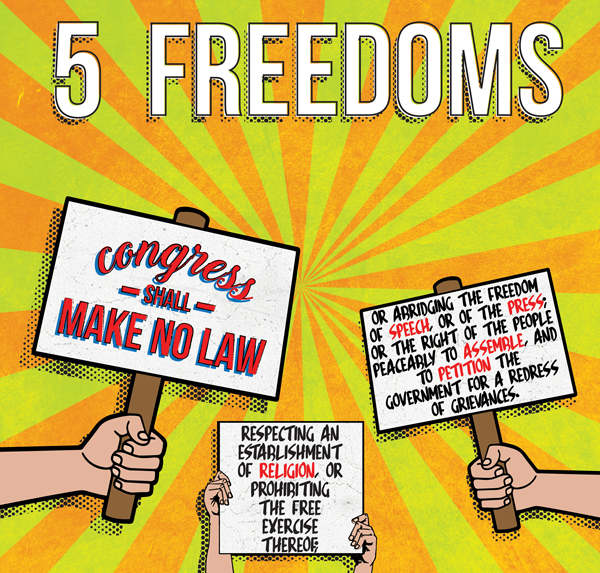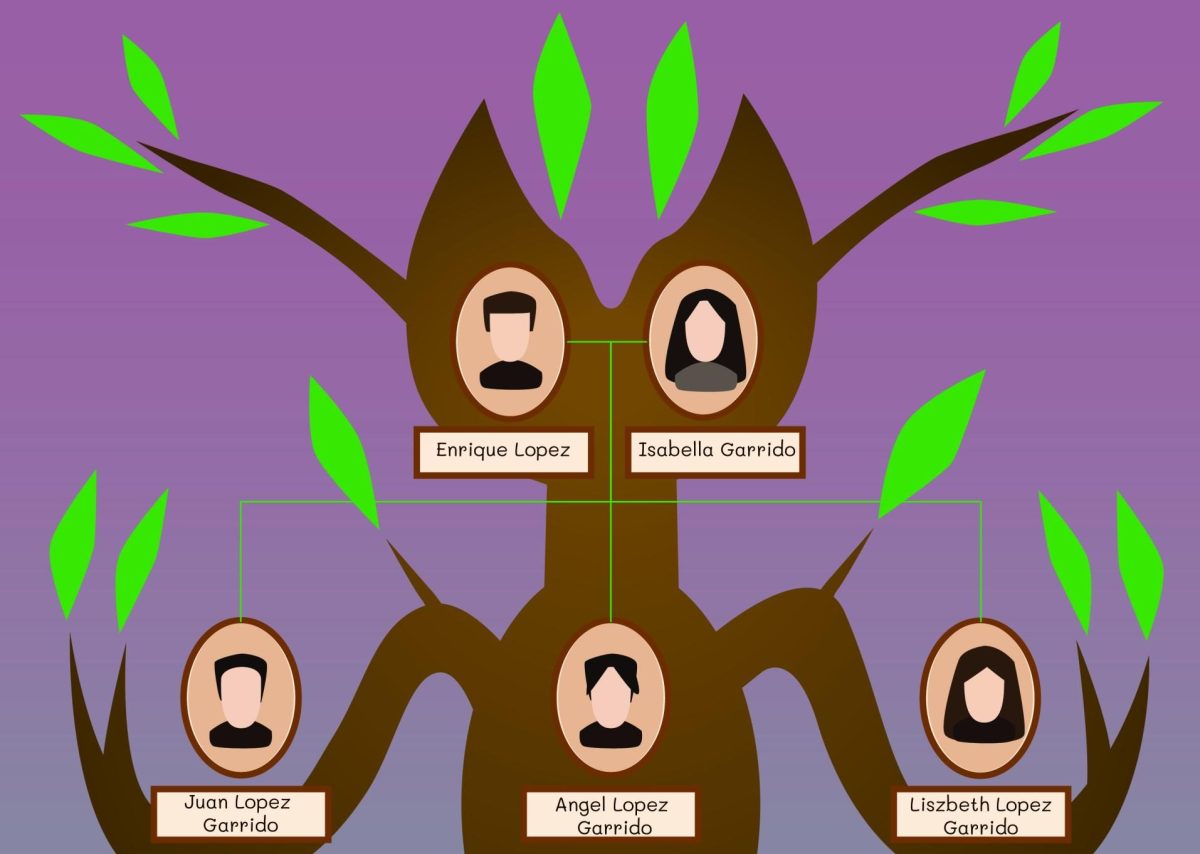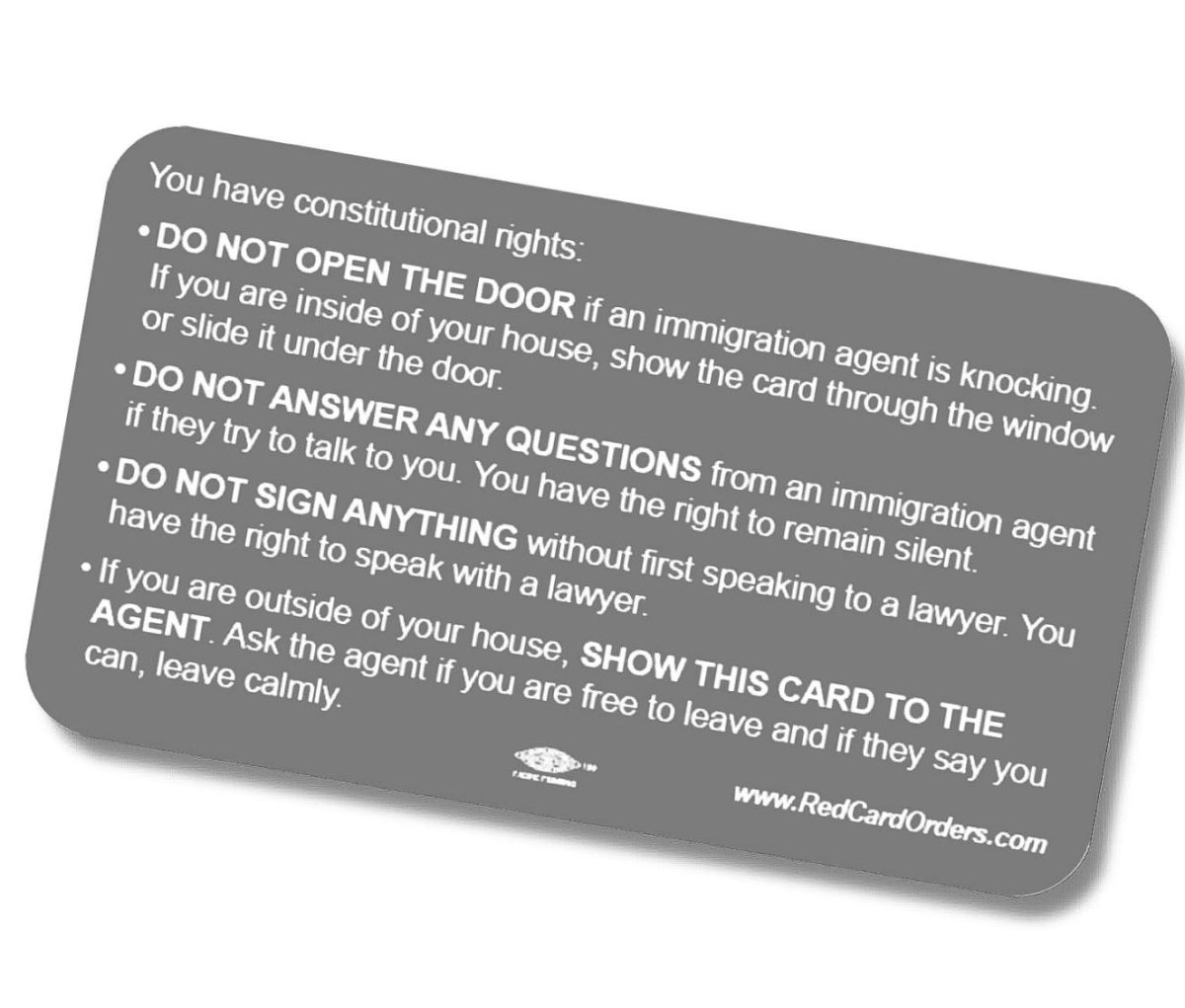
By JAMES HARTLEY
@JamesHartleyETC
October 16-22 is Free Speech Week, an annual non-partisan celebration of the freedoms of speech and the press.
In recognition, The Et Cetera staff examined the five freedoms, including speech and press, guaranteed by the First Amendment.
“Congress shall make no law respecting an establishment of religion, or prohibiting the free exercise thereof; or abridging the freedom of speech, or of the press; or the right of the people to peaceably assemble, and to petition the government for a redress of grievances.”
Religion
What it means:
The government cannot establish a state religion, and people may worship any faith they choose.
Current issues:
The full scope of freedom of religion has been debated in recent years after a bakery privately owned by a Christian was taken to court for declining to bake a cake for a same-sex wedding, a county clerk refused to sign same-sex marriage licenses and President Donald Trump signed an executive order placing a temporary moratorium on travel and immigration from a handful of Muslim nations with connections to terrorism.
What people think:
Shazia Ali, an English professor, said that she does not believe religious liberties are under any real attack today, but that they will be in the near future. Ali, a Muslim immigrant, said like a baker being taken to court for refusing to bake a cake for a same-sex wedding and the multiple attempts at placing a temporary moratorium on immigration or travel from specific countries— most of them Muslim-majority nations — are rare recent examples of religious liberties being attacked.
“The travel ban itself was definitely a violation I believe,” Ali said. “I was at the airport protests for almost three days. I did feel it was outrageous. It was unprecedented. … If this was any country other than America, we would still be able to, to a certain degree, understand this. But when you think about America, when you think about what it stands for in the world, as an immigrant myself, even before I arrived in this country I was told it is the land of the free.”
Jonathan Payan, a theater major, said he believes private businesses should be allowed under the First Amendment to operate within their religious beliefs.
“Everyone believes in their own thing,” Payan said. “They should have the right to practice their religion because that’s a part of their culture and a part of who they are.”
Ali said there is also a lot of anti-Jew sentiment that she has seen, but does not believe religious freedoms are in any immediate danger.
[READ MORE: Forum Addresses Safety On Campus]
Speech
What it means:
Government cannot interfere in a people’s right to express themselves.
Current issues:
New issues have been brought to the discussion about free speech in the wake of a series of eruptions of violence on college campuses from protestors trying to shut down speakers, a radical left-wing movement advocating for the prohibition of hate speech has clashed with a radical right-wing white nationalist movement and professors have been doxed and targeted by the White House for sharing political views in classrooms.
What people think:
Speech professor Courtney Brazile said the responsibility of limiting speech does not fall on the government, but on each person.
He said social norms should define what is acceptable speech.
“We do have the right to say what we want to say, and I think that’s what makes America great. But at the same time we don’t,” Brazile said. “We should not abuse that right to make other people feel inferior or less [than others] or culturally divide the classroom or even our communities.”
Nick Vera, another speech professor, said he believes in absolute free speech.
“I don’t think any speech is hate speech,” Vera said. “There’s hateful speech, but I don’t think any speech should be illegal. So that puts me, I think, in a really weird box.”
Vera said that the actions of alt-left protestors and white nationalists cross a line when they become violent, but that the speech of each side should still be protected.
“I’m always going to be on the side of free speech, and that includes zero limitations,” Vera said. “Now the minute you start getting out there and hitting people and, you know, and causing riots, with your physical actions, that’s what I’m against.”
The Press
What it means:
Government cannot interfere with the media.
Current issues:
Government officials have shown a distrust of the media and made broad claims of “fake news” and overall trust in journalists has been found at an all time low in recent years. Moreover, Trump has questioned the ability of his administration to interfere with and stop the press from printing news the president disagrees with.
What people think:
At the start of the 2016 presidential election, members of the press found their credibility and reputations questioned and even attacked. Some have said the press does not engage in enough bias when confronted with political issues while others have taken to calling traditionally reputable news sources “fake news.” While trust in the media is still low—a September 2016, Gallup News reported that trust in the press was at a record low of 32 percent of Americans saying they had a “great deal” or “fair amount” of trust for the media— Gallup reports that trust is on the rise, in part because of Trump. A 9 percent increase, to be exact.
Adjunct journalism professor Jacqueline Fellows said actual fake news makes it hard for many to discern good journalism.
“There are people who make up news stories and spread them online,” Fellows said. “These stories contribute to confusion about real news.”
Trump has fueled the distrust in the press.
He banned media outlets from White House press briefings and publicly attacked journalists, newspapers and broadcast stations.
His feud with CNN, whom he frequently refers to as “fake news,” has been widely televised and written about.
His Twitter assaults have been equally publicized.
Trump even questioned if network news channels could lose their broadcasting licenses for things they publish.
“With all of the Fake News coming out of NBC and the Networks, at what point is it appropriate to challenge their License? Bad for country!” Trump tweeted Oct. 11.
This isn’t the first time Trump has toyed with the idea of limiting the ability of the press to distribute news.
During the 2016 election, Trump said Feb. 27 at a rally in Fort Worth that he wanted to look at expanding libel laws.
“I’m going to open up libel laws so when [media] writes purposefully negative and horrible and false articles, we can sue them and win lots of money,” he said. “When The New York Times writes a hit piece, which is a total disgrace, and when The Washington Post, which is there for other reasons, writes a hit piece, we can sue them and win lots of money. … We’re going to sue you like you’ve never got sued before.”
History professor Matt Hinckley said journalists are vital parts of a functioning democracy.
“We also need professional journalists who won’t bow to pressures from owners and advertisers who want certain stories dropped or sanitized,” Hinckley said. “In other words, it’s part of the job of the good reporter to make people angry, to comfort the afflicted, and to afflict the comfortable.”
[READ MORE: Controversial Books Face Ongoing Challenges]
Petition and Assembly
What it means:
People may gather in peaceful protest and have the ability to seek remedies from the government when they feel they are wronged.
Current issues:
Violence in protests and questions about the right of groups labeled as domestic terrorist or hate organizations has brought up questions about where a non-violent protest is no longer protected.
What people think:
Antifa, a radical left wing organization made up mostly of college aged people, has resorted to violence to stop speakers they deem to be fascist, racist or otherwise hateful. Meanwhile, actual white nationalists have come out into the public to march with Confederate battle flags, Nazi flags with swastikas, tiki torches, firearms and riot gear. Many of their protests end with violence between them and counter-protestors. A protest in Charlottesville on Aug. 12 ended with one dead and 19 injured after a white supremacist plowed his car through a crowd. But government professor Glynn Newman said that, even if a person’s beliefs are “morally wrong,” they have a right to speak them, so long as they do not become violent.
“It’s a First Amendment right,” Newman said. “The people have the ability to redress the government because the people, we are the governed.”
Government professor Kat Reguero said protests and petitions can have positive impacts and can be some of the most effective ways for ordinary people to have their voice heard.
“If you don’t know that there are people that are like you, you’ll be quiet,” Reguero said. “If it is something that is important to you and it’s not rediculous, the have to answer it.”
—Bryan Crady, Bryson Ray, Jay Hill and Keaira English contributed to this report.
https://eastfieldnews.com/2017/10/03/unt-dallas-eastfield-begin-dual-enrollment/







